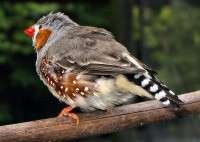Which Side Are You On? Birds Need Tutoring to Find Out

(PhysOrg.com) -- Just like us, songbirds need tutoring to learn to vocalize and sing.
Rutgers researchers Mimi Phan and David Vicario study bird brains in order to understand how humans learn to talk. Songbirds are among the few types of animals that learn their vocalizations by imitating their caregivers in infancy, a process with significant parallels to human language development.
The current work demonstrates that songbirds need experience with tutoring, either from parents or surrogates, for their brains to develop a key functional property known as lateralization. In lateralization, there is a division of labor between the brain hemispheres for certain tasks.
Phan, a research associate and Vicario, a professor, both in the Department of Psychology in the School of Arts and Sciences, recently published their findings in The Proceedings of the National Academy of Sciences (PNAS).
Lateralization in the human brain has long been known: the left brain hemisphere controls speech production and decoding in most people. Previous studies in songbirds have shown that the control of singing is also lateralized. In their recent PNAS paper, the Rutgers researchers tested responses in the brain when the bird hears a song and found clear differences in the way the two hemispheres process this social communication signal. Most important, birds deprived of appropriate auditory input during development don’t lateralize. This suggests that early experience with vocal sounds may impact the two hemispheres differently.
Phan and Vicario proved this by manipulating the auditory environment of juvenile zebra finches of both sexes. They isolated the birds. Some birds were tutored with natural songs (produced only by male, not female zebra finches). Others heard no external sounds; the only vocalizations these young birds heard were their own. Finally, they raised some birds that were unable to vocalize. Some of these mute birds heard tutor songs, while others did not. When the birds were adult, microelectrodes were used to measure the electrical activity in each hemisphere, in all the groups of birds with different early experience.
Intact male birds, tutored or untutored, showed lateralization but mute, untutored birds raised in silence did not - indicating that the birds have to hear something in their early experience in order to lateralize. For intact female zebra finches, hearing their own non-song vocalizations wasn’t enough, although mute, untutored females showed a more complex picture that will require further study.
These results in songbirds show lateralization is not completely hard-wired, but depends on the birds’ early experience with complex species-typical vocalizations. If what appears true for zebra finches is true for humans, then infants deprived of appropriate auditory experience (due to hearing loss or isolation) may fail to develop normal lateralization, which, in turn, could lead to defects in speech processing or production.
More information: PNAS paper: www.pnas.org/content/107/5/230 … c2-aa82-c1d56b78a237
Provided by Rutgers, The State University of New Jersey















